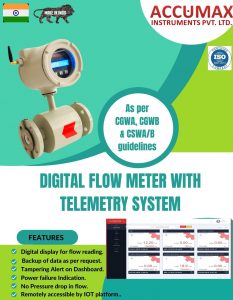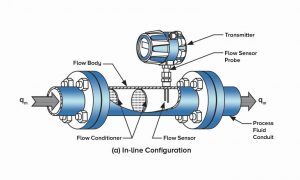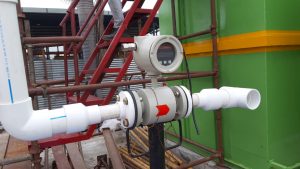Electromagnetic Flow Meters represent about 24% of all flow meters sold today. Applications for dirty liquids are found in the water, wastewater, mining, mineral processing, power, pulp and paper, and chemical industries. Water and wastewater applications include custody transfer of liquids in force mains between water/wastewater districts. Magnetic flow meters are used in water treatment plants to measure treated and untreated sewage, process water, water, and chemicals. Mining and mineral process industry applications include process water and process slurry flows and heavy media flows.
With proper attention to materials of construction, the flow of highly corrosive liquids (such as acid and caustic) and abrasive slurries can be measured. Corrosive liquid applications are commonly found in chemical industry processes and in chemical feed systems used in most industries. Slurry applications are commonly found in the mining, mineral processing, pulp and paper, and wastewater industries.
All measurement principles have their strengths and weakness, which determine when they are the best option.
PROS
- The obstruction to the flow is almost nil and therefore this type of meters can be used for measuring heavy suspensions, including mud, sewage and wood pulp.No pressure loss.
- They are practically unaffected by variation in density, viscosity, pressure and temperature.
- There is no pressure head loss in this type of flow meter other than that of the length of straight pipe which the meter occupies..
- They are not very much affected by upstream flow disturbances.Less maintenance.
- The meters are suitable for most acids, bases, water and aqueous solutions because the lining materials selected are not only good electrical insulators but also are corrosion resistant.
CONS
- Electrical Conductivity of the liquid media required should be equal to or more than 5μS/cm.
- Incrustation can cause errors.
- Only effective on conductive fluids and materials such as unmixed hydrocarbons and gases cannot be measured.
- As the meter always measures the volume rate, the volume of any suspended matter in the liquid will be included.
- To avoid any trouble which would be caused by entrained air, when the flow tube is installed in a horizontal pipe-line, the electrodes should be on the horizontal diameter.
- To avoid any trouble which would be caused by entrained air, when the flow tube is installed in a horizontal pipe-line, the electrodes should be on the horizontal diameter.






